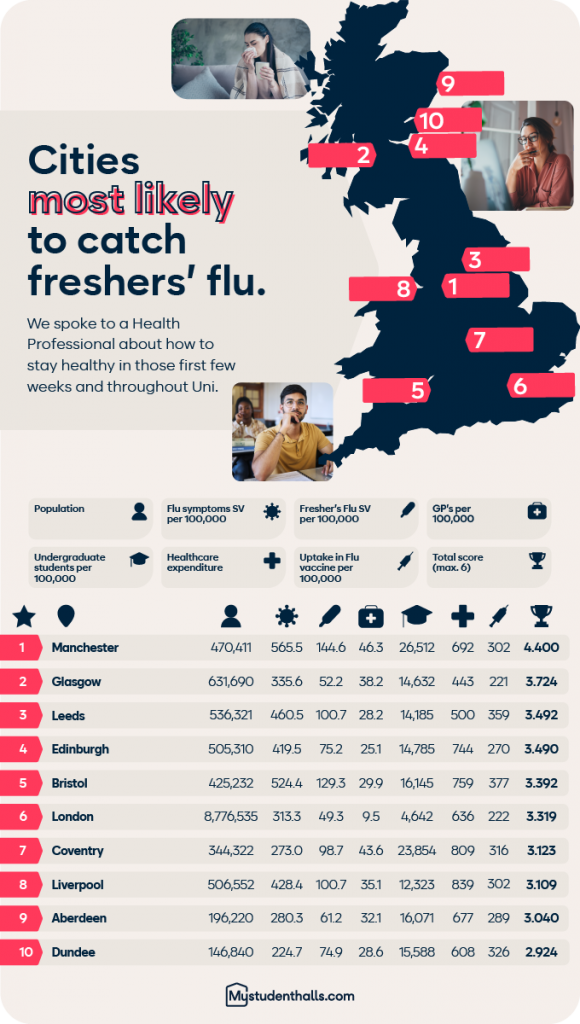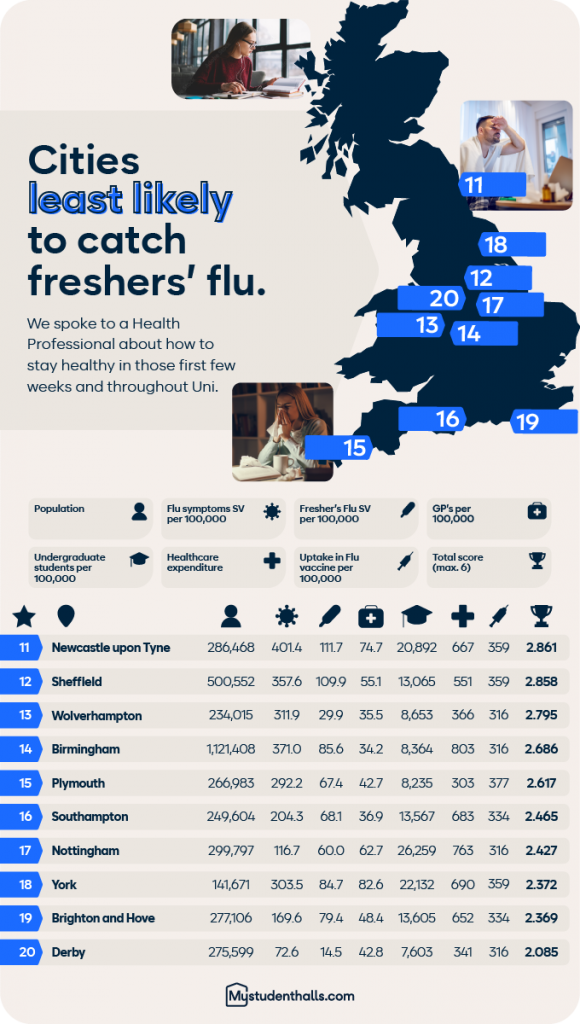The UK cities where you’re most likely to catch freshers’ flu

Whether you’ve managed to bag your spot at one of the UK’s most prestigious seats of learning, or you’re just happy to have gotten a place in your university of choice, one thing is for sure – if this is your first year of university, you’re almost certainly going to catch freshers’ flu.
A common phenomenon no matter which university you attend, freshers’ flu is best described to those who’ve never had it as a fantastic blend of a hefty cold mixed with a consistent, low-grade hangover (and given what most people’s first weeks of university are like, it probably is a combination of both).
However, even the venerable old guard of third-year and master’s students are not immune to this disease, nor are the lecturers themselves, with everyone getting just that little bit ill until their immune systems can get a handle on things.
But, with all that being said, some universities are definitely worse for spreading freshers’ flu than others. So, in order to find out which universities these are, we ranked 20 of the UK’s most popular university cities on a number of key factors, including the number of undergrads, available health facilities, flu vaccine uptake, and more.
Ready to see the results? Read on to find out if your university made the top 5!
The top cities where you’re most likely to catch freshers’ flu
Normally when reading a top list, it would be a badge of honour to come in first place (such a list is, after all, about being the best at something). However, when it comes to whether or not you’re the best place to get someone ill, we’d argue you probably want to be as low down the list as possible:

1. Manchester
Coming in at number one as the university most likely to provide you with freshers’ flu, we have Manchester. One of the UK’s most popular universities, Manchester’s sizable student population of 26,512 undergrads per 100,000 all but guarantees you’ll be in close proximity to someone with a cough or two.
In fact, stats show that, on average, around 144.6 searches (per 100,000) are being made during the freshers’ period (July-October) in order to find some relief from freshers’ flu specifically, while a further 565.5 searches are being made around flu in general. Add to this the somewhat low levels of GPs available to students at 46.3 per 100,000 and you might want to think about getting a flu jab top-up before you start your first week.
And speaking of flu jabs, Manchester students actually performed quite poorly in the uptake of this crucial vaccine, with only 302 students per 1,000 popping in for a top-up, which puts them in the lower end of this category (and makes it more likely that you’ll catch the flue while you’re there).
2. Glasgow
Next up we have one of Scotland’s favourite cities – Glasgow. A go-to option for anyone not interested in attending Edinburgh, Glasgow actually has substantially fewer undergrads per 100,000 than Manchester at only 14,632, but that didn’t stop it from landing in second place.
Indeed, Glasgow students have even fewer GPs to look forward to than Manchester at 38.2 per 100,000, not to mention a far lower flu vaccine uptake at 221 per 1,000. However, Glasgow is saved from the top spot by the fact that, overall, there just seem to be fewer cases of flu going around in general.
Stats suggest that, out of 100,000 people, roughly 335.6 searches are being made around symptoms relating to genuine case of flu, while a further 52.2 searches are being made around freshers’ flu specifically. Maybe this is because of the Scot’s natural hardiness compared to the average Brit, or maybe it’s just luck – either way, such low numbers are enough to save Glasgow from placing first.
3. Leeds
Heading back down south while still staying the north, Leeds has the unenviable honour of taking up our list’s final podium position by placing third overall for freshers’ flu hot spots. And given that it has a higher flue rate in general than Glasgow, we’re surprised it didn’t place higher.
As it turns out, out of every 100,000 people in Leeds, at least 460.5 searches are being made around flu in general, while 100.7 searches are focused around full-blown freshers’ flu and how to relive it. And with just 28.2 GPs available per 100,000 students, it’s safe to say that medical access is a little restricted.
But, given that Leeds only came third, it must have some saving grace, right? Well, with slightly fewer undergrads per 100,000 students than Glasgow at only 14,185, you do have somewhat smaller odds of getting ill in general. Combine this with an excellent flu jab uptake of 359 people per 1,000 and at least one-third of students are going in protected.
4. Edinburgh
Hopping back up to Scotland, our fourth-place university is none other than the capital city of Edinburgh. Home to one of the UK’s most revered universities, Edinburgh, sadly, will not be pleased to know they’re also one of the best places in Britain to get freshers’ flu.
For starters, Edinburgh actually has fewer GPs per 100,000 than even Glasgow at only 25.1. Not only that, but their flu vaccine uptake per 1,000 people is lower than even Manchester’s at 270.
And yet, Edinburgh, much like Glasgow, is saved from a higher spot on our ranking, thanks in large part to the low flu levels experienced in general. Stats actually suggest that, out of an undergrad population of 14,785 per 100,000, 419.5 searches are being made in relation to real flu symptoms, and 75.2 in terms freshers’ flu specific symptoms.
5. Bristol
Last, but by no means least, Bristol is here to round off our top five locations in the UK to visit if you want to catch freshers’ flu during your first semester. Indeed, given the stats available, it’s a wonder that Bristol did not place any higher.
First of all, Bristol has the highest rate of flu searches per 100,000 on our list, sitting at 524.4 overall, as well as the highest rate of freshers’ flu searches at 129.3. Not only that, but Bristol also sits fairly low for GP access as well, at only 29.9 per 100,000.
So, what is it that saves Bristol from a higher spot on our ranking if it’s the most common university on our list for spreading flu? Well, as if to counter this fact, Bristol is also joint first alongside Plymouth for flu vaccinations at 377 per 1,000, which will go a long way towards staving off those troublesome coughs and sniffles.
Which are the best cities for avoiding freshers’ flu?
While we’ve so far touched exclusively on the places in the UK where you’re most likely to acquire freshers’ flu, you’re also probably wondering which universities have the lowest rates of freshers’ flu overall.
And for that, we have good news if you’re planning on going to university in Derby, Brighton and Hove, or York, all of which scored very well in all of the ranking factors that we used.
Derby, for example, had only 14.2 searches around freshers’ flu per 100,000 and a reasonable 42.8 GPs per 100,000 residents. Not only that, but Derby residents are getting their flu jabs in at 316 per 1,000 people.
It’s also a similar case for Brighton and Hove and York, which averaged a rate of 334 and 359 flu jabs per 1,000 people, and 48.4 and 82.6 GPs per 100,000 people respectively – both of which ensure that students at these three universities can dodge that dreaded flu when it comes rolling around.

What can freshers do to stay healthy in their first weeks of uni?
Although going to university is mainly about learning (and a little bit of partying), for a lot of new students, it’s also the first time they’ve lived away from home and been solely responsible for their health and well-being.
Naturally, this can seem like a lot of responsibility at first, which is why we spoke to a Dr William Colyer, an expert in staying healthy at uni, to offer you some friendly tips or advice before you arrive, with a focus on healthy eating and good exercise:
Eating healthily at uni
“When it comes to eating healthily at uni, try to make as much of your own food from scratch as often as you can. This doesn’t have to be every day, and getting regular takeaways is a given on those late nights out, but as much as it can seem like an effort, learning to cook will give you an essential life and health skill in the future.
“And when you are cooking, pay particular attention to indulging in high-starch foods, fibre, and veggies. Starchy foods such as pasta, potatoes and rice will keep you well energised throughout the day, and gram for gram contain under half the amount of calories as fat.
“Meanwhile, high-fibre foods have two main benefits – helping you to feel full and boosting gut health. This is because the body is unable to digest high volumes of fibre in one go meaning you’re able to fill up on fibre-y foods without taking on too many extra calories.
“This in turn will also promote good gut health, which will reduce your risk of bowel cancer, improve bowel movements, and enhance your gut biome. Good examples of high-fibre foods are whole wheat pasta, brown rice, porridge oats, and vegetables such as carrots, broccoli, and kale.
“As you’ve no doubt heard, it’s recommended that you eat 5 portions of fruit and veg a day – one portion being classed as 80g of fresh produce or 30g of dried. If you can aim for more than 5 a day great, but just make sure to focus on getting a wide variety of fruits and veg, that way you maximise the amount of vitamins and minerals you take on board.
Staying fit at uni
“Much like eating properly, staying on top of exercise can be difficult at uni, but I would say that the easiest way to get some regular exercise in is by joining a sports club. They’re really social and can provide a structure to your week, with many providing extra fitness sessions outside of training. And if you’re not normally into sports, uni is the perfect chance to do something different like ultimate frisbee, pole dancing, and ice hockey, all of which are great forms of exercise.
“Alternatively, if you’d rather join a gym, I’d recommend joining with a friend. Having someone else keep you accountable and help motivate you to go is invaluable. I would also make sure you look around the gym you’re planning on joining. It’s important you feel comfortable in the space to make sure you actually want to keep going back. If you’re completely new to working out, it may be worth joining a gym that comes with a couple of free PT sessions or gym classes to show you the ropes as you get into it.
“Finally, If you’re struggling to find time for exercise, implementing a regular HIIT workout into your routine could be just what you need. You can find lots of example templates online, take only 20 minutes to do, and have been proven to increase your exercise capacity, metabolic health, and lower your overall blood pressure. Best of all, only a small amount of space is needed and no gym equipment. Just be careful not to cause too much noise for your downstairs neighbour.”
So, there you have it, those are the top places in the UK for spreading freshers’ flu at the start of the semester. Of course, it should be pointed out that all universities have a habit of offering freshers’ flu as part of the overall package experience, and you shouldn’t let higher chances of a brief cold put you off going to your dream university.
And speaking of going to your dream university, if you’re in need of accommodation before you start, or you want a more private space while you settle in to do your masters, then Mystudenthalls.com has you covered.


